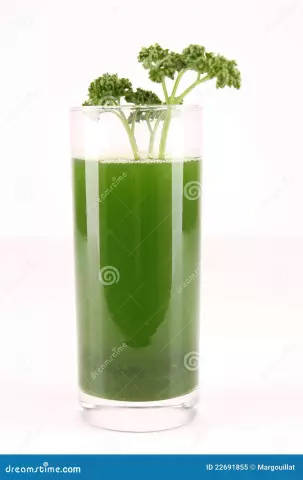- Author Rachel Wainwright wainwright@abchealthonline.com.
- Public 2023-12-15 07:39.
- Last modified 2025-11-02 20:14.
Parsley juice

It is difficult to imagine a dining table without the presence of parsley on it. It is one of the most popular plants that uses both leaves and roots for food. In summer, its fresh herbs are added to salads, soups, main courses. In winter, dried or frozen leaves are used. In addition, infusions, decoctions and even juice are prepared from parsley. It is precisely about parsley juice that we will talk with you in this article.
Why parsley juice is useful
80% parsley juice is water. It contains proteins (4%), carbohydrates (8%). Its calorie content is quite low and is only 47 kcal per 100.0 ml of juice.
Parsley juice is a valuable source of vitamins and minerals for humans, the content of which is in no way inferior to other fruit or vegetable juices. It contains ascorbic acid, B vitamins, nicotinic acid, retinol, carotene, vitamins K and PP. In addition, parsley juice is rich in bioflavonoids - biologically active substances with a powerful antioxidant effect, thanks to which they protect cell membranes from damage by free radicals. Bioflavonoids are also essential for the absorption of vitamin C. Parsley juice has been shown to give the walls of blood vessels flexibility and elasticity. Therefore, it is recommended to include it daily in the diet for people suffering from vascular diseases.
Speaking about the usefulness of parsley juice, one cannot fail to note the huge variety of micro and macro elements it contains. It is rich in potassium, magnesium, phosphorus, sodium, calcium and iron.
Parsley juice has a pronounced diuretic effect. It is recommended for use by people suffering from diseases of the urinary system, as well as patients with diseases of the cardiovascular system, accompanied by edema. Parsley juice not only removes excess water from the human body, but also has an anti-inflammatory effect. The results of repeated studies have shown that its regular use reduces the activity of the inflammatory process in the kidneys, urinary and gall bladder. In addition, parsley juice helps to dissolve gall and urinary calculi (stones).
It is important to know and what is the use of parsley juice for diseases of the digestive system. It stimulates the production of digestive juices, improves intestinal peristalsis, increases appetite.
Parsley juice helps to lower blood sugar levels, i.e. has a sugar-reducing effect. Its daily inclusion in the menu of patients with diabetes mellitus improves the course of the disease and allows, over time, to reduce the dosage of insulin.
To normalize the menstrual cycle, it is recommended to drink a mixture of parsley and beet juice daily. Well, if you have vision problems, then a "cocktail" of carrot and parsley juices will become irreplaceable for you.

Fresh parsley juice can be used to lubricate itchy insect bites. Within a few minutes after this procedure, the pain, itching subsides, and redness decreases.
Parsley juice is not recommended for pregnant women.
Parsley juice for face
Parsley juice allows not only to improve the complexion, but also to smooth out fine wrinkles, because the biologically active substances contained in it improve the metabolic processes of the epidermis. We recommend you several ways to use parsley juice for your face, thanks to which you will become significantly younger and more beautiful:
1. Squeeze the juice from the parsley and dilute it with cold boiled water in a ratio of 1 to 10. Pour the resulting liquid into ice cube trays and freeze. With the obtained green cubes, wipe the skin of the face, neck and décolleté once or twice a day.
2. Mix 2 tablespoons of low-fat cottage cheese with one teaspoon of parsley juice and ½ teaspoon of olive oil. Rub the mixture thoroughly. Apply it all over the face, excluding the area around the eyes. After half an hour, wash off the mask with cool water, and apply any oily cream on the skin.
3. For oily skin, parsley juice can be effectively combined with honey and lemon juice in a ratio of 1: 2: 0.5. Apply the resulting mixture to the skin and rinse with cool water after 15 minutes.
4. To treat acne, you should wipe problem areas once a day with a cotton swab dipped in parsley juice.
Found a mistake in the text? Select it and press Ctrl + Enter.






